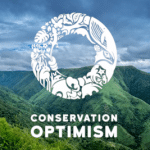Wondering what went right this week in the conservation world? We’ve got you covered with our Conservation Optimism Round-Up! Each week we are collating stories of optimism from around the globe so that you never miss your dose of Monday Motivation.
1. New nature reserve declared in Kazakhstan
“Kazakhstan is set to create a new nature reserve, conserving over 657,000 hectares to conserve a critical migration corridor for critically endangered Saiga Antelope”
2. New technology ‘listens’ for endangered right whales
“One of the world’s most endangered whale species could have added protection from threats posed by human marine activity, through technology developed by the University of East Anglia (UEA). UEA researchers have developed machine learning techniques that can be used to detect the presence of North Atlantic right whales by listening for the sounds they make underwater.”
Right whales have a complex language, such as upcall tones & gunshot sounds. Perhaps if we could hear them this critically-endangered species would have a better chance. This new technology aims to help us listen, & respond. #conservationoptimismhttps://t.co/oIDY9M2jXW
— Wildstars.TV (@WildstarsTV) June 5, 2021
3. Biden administration suspends oil and gas leases in Arctic National Wildlife Refuge
“The Biden administration on Tuesday suspended oil and gas leases in the Arctic National Wildlife Refuge, targeting one of President Donald Trump’s most significant environmental acts during his last days in office..”
Happy to share this #goodnews. Biden administration to cancel oil and gas leases in Arctic National Wildlife Refuge #Arctic #ArcticNWR #ConservationOptimism https://t.co/u0k4EBWkXD
— Nancy EarthDayEveryDay Castaldo (@NCastaldoAuthor) June 1, 2021
4. Galápagos tortoise found alive is from species thought extinct
” Genetic tests have confirmed that a giant tortoise found on the Galápagos Islands is from a species which scientists thought had died out more than a century ago. The single female was discovered during a 2019 expedition to Fernandina Island.”
Fantastic news as genetic tests have confirmed that a giant tortoise found on the Galápagos Islands is from a species which scientists thought had become extinct more than a century ago! https://t.co/u41rL34R0X #rewilding #conservationoptimism pic.twitter.com/SO89iLKcKY
— Citizen Zoo (@CitizenZoo) June 1, 2021
5. Redonda: The Caribbean island transformed into an eco haven
“Virtually untouched by humans for centuries, Antigua and Barbuda’s lesser-known third island has long been a key nesting site for migrating birds from across the world and home to wildlife found nowhere else on Earth.”
"At a time when so much of the news about the state of our planet is understandably downbeat, the rebirth of Redonda shows that if we give nature a chance, it can and will
— Fauna & Flora Int. (@FaunaFloraInt) June 5, 2021
bounce back."
🔎 @BBCNews: https://t.co/ovhtzKFAZY@EAGAntigua | @Darwin_Defra | #WorldEnvironmentDay 🌍 pic.twitter.com/VKDu0imgGi
6. Giant otter thought to be extinct in Argentina resurfaces. Literally
“Once believed to be locally extinct, a wild giant otter was sighted in Argentina’s Impenetrable National Park. The species hasn’t been seen in the country for about 40 years“
Some good news to kick off your day! 🦦🦦🦦https://t.co/yEYKwT3JZh
— San Antonio Zoological Society 🦏 (@SanAntonioZoo) June 2, 2021
7. New recordings of critically endangered night parrots music to ears of scientists
“It could be Australia’s rarest bird and was only photographed for the first time within the past ten years, but new evidence collected by Indigenous rangers has uncovered the country’s largest known night parrot population.”
Some #ConservationOptimism and the importance of traditional knowledge for protecting species and habitats: Recordings of critically endangered night parrots music to ears of rangers, scientists https://t.co/Lo0PZLN9R1
— Anna MacDonald (@Dr_AnnaM) May 29, 2021
Have a story to share for our weekly round-up? Use #ConservationOptimism on Twitter, Facebook, LinkedIn and Instagram!


